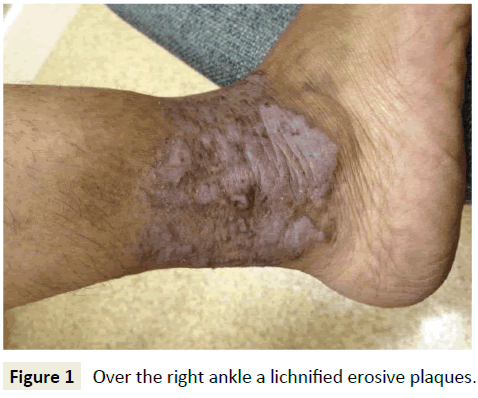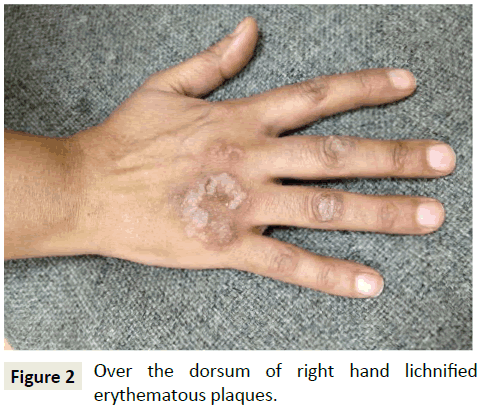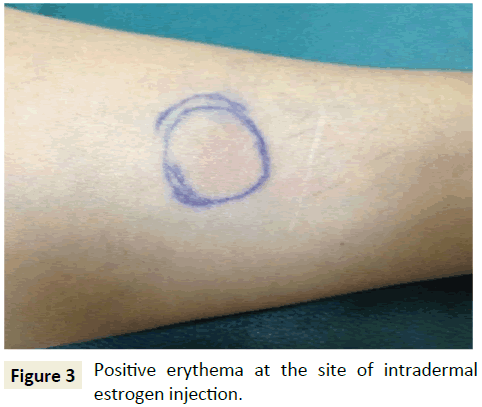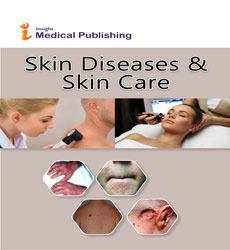Case Report of Rare Estrogen Dermatitis
Hindi S, Magliah T*, Alturkistani E and Alwasiah B
Hindi S1, Magliah T2*, Alturkistani E3 and Alwasiah B4
1Dermatology Department, King Fahad General Hospital, Jeddah, Saudi Arabia
2Dermatology Department, National Guard Hospital, Jeddah, Saudi Arabia
3Dermatology Department, Hera General Hospital, Makkah, Saudi Arabia
4Medical Intern, King Abdulaziz University, Jeddah, Saudi Arabia
- *Corresponding Author:
- Tahani Magliah
Senior Resident, Department of Dermatology
National Guard Hospital, Jeddah, Saudi Arabia.
Tel: 00966508741383
E-mail: mezo106@gmail.com
Received date: November 07, 2017; Accepted date: December 01, 2017; Published date: December 08, 2017
Citation: Hindi S, Magliah T, Alturkistani E, Alwasiah B (2017) Case Report of Rare Estrogen Dermatitis. Skin Dis Skin Care. 2:24
Abstract
Estrogen dermatitis is a rare type of dermatitis associated with cyclical skin eruptions pre menstrual cycle. We reported a 41 year old Saudi female who had repeated visits to dermatology clinic because of skin eruption pre menstrual cycle. Intradermal estrogen was tested and was Positive. Although this case is rare, it should be considered in differential diagnosis as pre menstrual (cyclical) dermatitis could be associated with estrogen hypersensitivity.
Keywords
Estrogen; Dermatitis; Pre-menstrual; Intradermal
Introduction
Oestrogen dermatitis is a rare skin disease, first described in 1995 [1]. It is characterized by skin eruptions in the form of urticaria, eczema, papulovesicular lesion or pruritus [1,2]. The condition is also characterized by its worsening with menstrual cycles in patients of known estrogen hypersensitivity [2]. Oskay summarized the criteria for diagnosis of estrogen dermatitis into three; cyclic skin lesions related to the menstrual cycle, a positive progesterone skin test or a positive oral/intramuscular challenge to progesterone and demonstration of a circulating antibody to the progesterone or basophil degranulation tests [3].
Case Report
A 41 year old Saudi female, medically free, came to our clinic complained of about 10 years history of skin lesions that flare with every pre menstrual cycle (Cyclical skin eruptions) and relieved with menstruation. The skin rash was associated with sever pruritus that interfere with daily activities. With every pregnancy, the skin lesions disappeared completely and then reappear back weeks after delivery. The skin lesions were mostly on the extremities with Lichnifications, crustations and erosions due to sever scratching (Figures 1 and 2).
No other skin lesions, no mucosal involvement. Intradermal estrogen skin test was done and the reading after 30 minutes showed positive results (Figure 3). The patient was given symptomatic treatment with anti histamine, mild to moderate topical corticosteroid and improvement was complete.
Discussion
In 1995, Shelley [4], coined the term Oestrogen dermatitis. They described women with premenstrual exacerbations of various eruptions, including papulovesicular eruptions, urticaria, eczema, and generalized pruritus. Their patients had positive intradermal skin tests to Oestrogen and responded to tamoxifen therapy. Since the original description, there have been a few reports of the condition with varied treatment approaches, including leuprolide acetate, progestin-only pill, and bilateral oophorectomy and hysterectomy [5]. Our case is a presentation of estrogen dermatitis, characterized by cyclical skin eruption before each menstrual cycle, and relieved with menstruation and pregnancy. The clinical presentation of estrogen dermatitis varied and the histologic findings are nonspecific. However, it usually presents as a cyclic cutaneous disorder that may be urticarial, eczematous, popular or bullous and is usually characterized by pruritus [3]. In general, there are no systemic symptoms or complications associated with or autoimmune estrogen disease other than none-specific symptoms such as pruritus, pain of dyspigmentation with the cutaneous eruption [6].
Positive intradermal estrogen skin test was observed. A positive reaction may be immediate (within 30 min) or delayed (24-96 h) [7]. No hormonal treatment was initiated only symptomatic treatment with anti histamine, mild to moderate topical corticosteroid was given. The patient completely recovered once entered menopause. In conclusion, in cases where a female comes to clinic with cyclical skin rash, estrogen dermatitis could be considered as a cause for diagnosis.
References
- Bourgeault E, Bujold J, Doucet ME (2017) A Rare Case of Oestrogen Dermatitis. JAAD 76: 23.
- Leylek OA, Unlü S, Oztürkcan S, Cetin A, Sahin M, et al. (1997) Estrogen dermatitis. Eur J Obstet Gynecol Reprod Biol 72: 97-103.
- Oskay T, Kutluay L, Kaptanocglu A, Karabacak O (2002) Autoimmune progesterone dermatitis. Eur J Dermatol 12: 589-591.
- Shelley WB, Shelley ED, Talanin NY, Santoso PJ (1995) Estrogen dermatitis. J Am Acad Dermatol 32: 25-31.
- Yoon TY, Kim YG, Kim MK (2005) Estrogen dermatitis responding to leuprolide acetate. J Dermatol 32: 405-406.
- Mutasim DF, Baumbach JL (2003) Bullous autoimmune estrogen dermatitis. J Am Acad Dermatol 49: 130-132.
- Stranahan D, Rausch D, Deng A, Gaspari A (2006) The role of intradermal skin testing and patch testing in the diagnosis of autoimmune progesterone dermatitis. Dermatitis 17: 39-42.
Open Access Journals
- Aquaculture & Veterinary Science
- Chemistry & Chemical Sciences
- Clinical Sciences
- Engineering
- General Science
- Genetics & Molecular Biology
- Health Care & Nursing
- Immunology & Microbiology
- Materials Science
- Mathematics & Physics
- Medical Sciences
- Neurology & Psychiatry
- Oncology & Cancer Science
- Pharmaceutical Sciences



